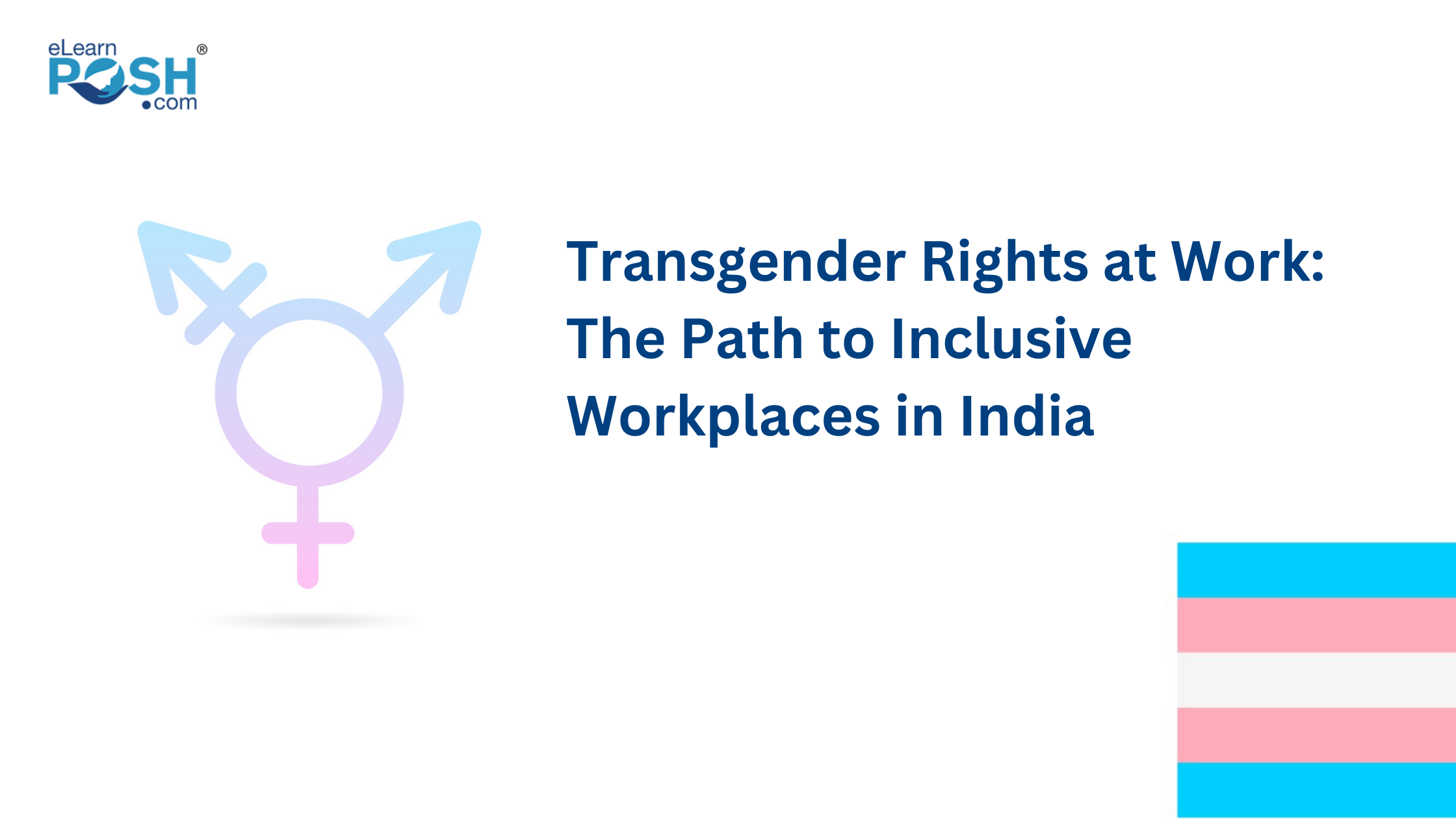 Introduction
Introduction
In a world that is progressively embracing diversity and inclusion, the rights of transgender individuals in the workplace have come into sharper focus. However, the journey towards equality is far from complete. One of the most pressing issues faced by transgender employees in India is the threat of sexual harassment, a problem that can hinder their professional growth and well-being. In this blog, our aim is to shed light on the issue of sexual harassment faced by transgender individuals in Indian workplaces. We will explore the legal remedies available to protect their rights, discuss how organizations can create safe environments, and ultimately advocate for a more inclusive and respectful workplace culture that benefits all transgender employees.
Transgenders and Sexual Harassment in Workplace
Who is a transgender?
Section 2(h) of the Transgender Persons (Protection of Rights) Act, 2019 defines transgender as,
“… a person whose gender does not match with the gender assigned to that person at birth and includes trans-man or trans-woman (whether or not such person has undergone Sex Regeneration Surgery or hormone therapy or laser therapy or such other therapy), person with intersex variations, genderqueer and person having such socio-cultural identities as kinner, hijra, aravani and jogta.”
This definition goes beyond the binary understanding of male and female, acknowledging the diverse experiences and identities within the transgender community. This legal recognition is a significant step towards safeguarding the rights and dignity of transgender individuals in India.
Sexual Harassment of Transgenders in Workplace
Workplaces should ideally be spaces where every individual is treated with dignity, respect, and fairness. However, for transgender employees in India, this ideal is often marred by the stark reality of sexual harassment. Sexual harassment is an alarming and pervasive issue that not only affects an individual’s well-being but also hampers their professional growth and overall quality of life.
Transgender individuals often face unique challenges when it comes to sexual harassment at work. They may experience harassment not only based on their gender identity but also due to societal biases and misconceptions about transgender people. These incidents of harassment can take various forms, from offensive comments and unwelcome advances to exclusion, discrimination, or even physical assault.
The impact of sexual harassment on anyone can be devastating. It can erode their self-esteem, cause emotional distress, and lead to a hostile work environment that hinders their productivity and career advancement. Many transgender individuals live with the fear of being “outed” or stigmatized, which can further isolate them and deter them from seeking help.
Furthermore, sexual harassment of transgender individuals in the workplace can be viewed as a form of discrimination under Article 14 and Article 19(1)(g) of the Constitution of India. Article 14 guarantees the right to equality before the law, and Article 19(1)(g) upholds the right to practice any profession, or to carry on any occupation, trade, or business. When transgender employees are subjected to sexual harassment, their fundamental rights to equality and the pursuit of their chosen professions are violated.
In recent years, there have been positive developments in the legal framework of India to protect transgender employees from sexual harassment. The Transgender Persons (Protection of Rights) Act, 2019, and the Sexual Harassment of Women at Workplace (Prevention, Prohibition, and Redressal) Act, 2013, have provisions to address such concerns and provide a platform for reporting and redressal. However, the effective implementation of these laws remains a challenge.
What are the Legal Remedies for the Transgender in Workplace?
In the quest for a more inclusive and equitable society, India has taken significant steps to protect the rights and dignity of transgender individuals. One vital aspect of this progress lies in providing legal remedies to address the various challenges faced by the transgender community, particularly concerning issues like discrimination and sexual harassment. Let’s explore the legal provisions in place to safeguard the rights of transgender individuals in India.
- Legal Recognition of Gender Identity: In landmark judgments, the Indian judiciary has recognized the right of transgender individuals to self-identify their gender. The Supreme Court of India, in the NALSA vs. Union of India case, affirmed the right to self-identification and recognized transgender individuals as the “third gender.” This recognition has paved the way for more inclusive policies and legal protections.
- The Transgender Persons (Protection of Rights) Act, 2019: Enacted in India to recognize and protect the rights of transgender persons, this landmark legislation defines and upholds the rights of transgender individuals. Under this law, transgender individuals have the right to self-identify their gender, access healthcare services, and pursue education and employment without discrimination. The Act also prohibits discrimination against transgender individuals in employment and in matters of recruitment.
Under Section 18(d) of the 2019 Act, any act of sexual harassment against a transgender individual is a punishable offense. Perpetrators of such harassment can face imprisonment for a term not less than six months but which may extend to two years and with fine. This provision reinforces the commitment to creating safe and inclusive workplaces where transgender individuals can thrive without the fear of harassment or discrimination. - The Sexual Harassment of Women at Workplace (Prevention, Prohibition, and Redressal) Act, 2013: This Act is not specific to transgender individuals, but it provides a crucial legal framework for addressing sexual harassment in the workplace. It acknowledges that all women, including transgender women, have the right to work in environments free from sexual harassment. Employers are required to establish Internal Committees (ICs) to address complaints of sexual harassment, ensuring confidentiality and protection against retaliation. It is important to keep in mind that the POSH Act, 2013 is enacted only for the protection of women in the workplace and that is why only trans-women (a person assigned male at birth but identifies as a woman) can seek protection and redressal under the said Act.
- Indian Penal Code, 1860: The IPC, 1860 does not have any specific provisions providing protection from sexual harassment faced by the transgender people. However, the trans-woman can file complaints with the Police for the sexual harassment faced by them under Section 354A (Sexual harassment and its punishment) and 509 (Word, gesture or act intended to insult the modesty of a woman) of the IPC, 1860.
While these legal remedies represent significant progress, challenges persist in the effective implementation of these laws and in changing societal attitudes. Raising awareness, advocating for change, and ensuring the enforcement of these legal provisions are crucial steps in creating a more inclusive and just society for transgender individuals in India.
How can organizations create a safe place for the transgenders?
In the dynamic landscape of modern workplaces, inclusivity has transcended mere rhetoric to become the cornerstone of ethical and thriving organizations. Recognizing the immense value in embracing diversity, companies are increasingly taking strides to ensure that all employees, including transgender individuals, feel secure, respected, and empowered within their work environments. The following are a few steps that the organization can take to make the workplace more inclusive for transgenders:
- Education and Awareness: Ignorance often breeds discrimination, and the first step toward inclusivity is education. Organizations should invest in workshops, training sessions, and awareness programs that foster a better understanding of transgender issues. These initiatives encourage open, respectful dialogues, breaking down stereotypes and biases that can alienate transgender individuals.
- Gender-Neutral Facilities: One concrete way to create a more comfortable atmosphere for transgender employees is the provision of gender-neutral restrooms and changing facilities. This straightforward accommodation fosters a sense of belonging and inclusion.
- Tailored Benefits: Acknowledging the unique needs of transgender employees, organizations should consider offering benefits that cater to their specific requirements. This might include health insurance covering gender-affirming procedures and mental health support, underlining the organization’s commitment to the well-being of its transgender employees.
- Robust Anti Bullying and Anti-Harassment Policies: Strongly communicate and enforce anti-bullying and anti-harassment policies. It is imperative that all employees, from top leadership to front-line staff, are aware of these policies and understand the consequences of violating them. The organization can take steps to establish a gender-neutral POSH Policy. Implementation of a gender-neutral policy can help boost the confidence of the all the people in the workplace that they are protected against sexual harassment at workplace.
- Creating Support Networks: An excellent way to foster a sense of community and support is through the encouragement of employee resource groups (ERGs) or affinity groups focusing on LGBTQ+ and transgender issues. These groups provide a platform for mutual support and advocacy within the organization.
- Leadership Training: Leaders and managers are often the flag-bearers of company culture. They should undergo specialized training on LGBTQ+ and transgender inclusion to ensure they are equipped to provide the necessary support to transgender team members.
- Pronoun and Name Inclusivity: Respecting an individual’s chosen name and pronouns is pivotal. Implement practices to ensure that names and pronouns are used correctly in all internal communications, from email signatures to ID badges and HR systems.
Conclusion
Building a safe and inclusive workplace for transgender individuals transcends mere corporate obligation; it represents a moral commitment to diversity, respect, and equality. By taking tangible steps toward acceptance and support, organizations can turn the principles of diversity and inclusion into a living reality, where everyone has the opportunity to thrive, regardless of their gender identity. The journey toward inclusivity is marked by education, policies that reflect respect, and a commitment to support. In this endeavor, each step taken is a step towards a future where gender identity is no barrier to success.
For more updates on POSH, kindly follow our LinkedIn page.
To book a personalized demo call directly with the Subject Matter Expert, you can write to sales@succeedtech.com



Leave a Reply